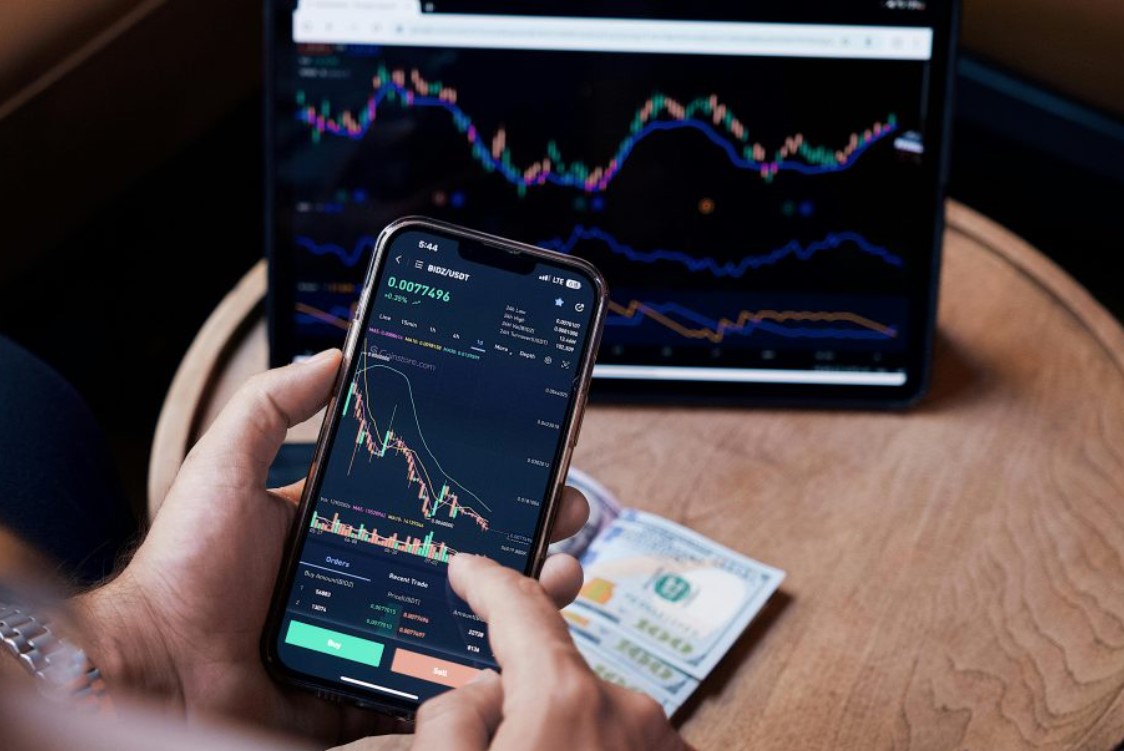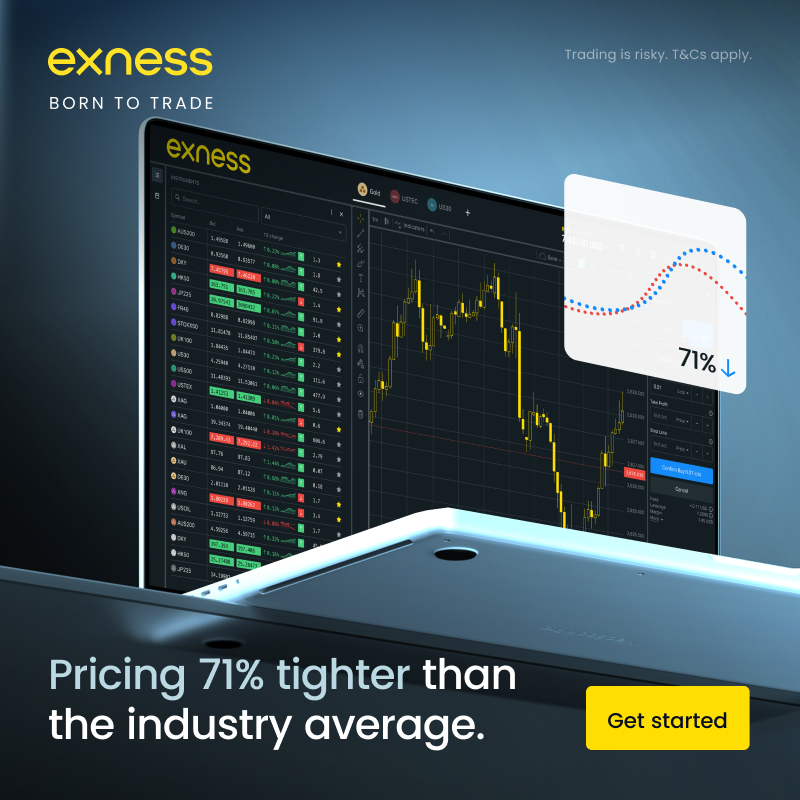
9 minute read
How Much Can You Earn from Forex Trading?
from Exness
by Exness_Blog
Forex trading, or foreign exchange trading, has become a buzzword in the world of finance. With promises of financial freedom and the allure of quick profits, many are drawn to the idea of trading currencies. But the burning question remains: How much can you earn from forex trading? Is it really a golden ticket to wealth, or is it a risky venture that requires skill, discipline, and patience? In this comprehensive guide, we’ll explore the earning potential of forex trading, the factors that influence profits, and what beginners need to know to set realistic expectations.
Top 4 Best Forex Brokers
1️⃣ Exness: Open An Account or Visit Brokers 🏆
2️⃣ XM: Open An Account or Visit Brokers 💥
3️⃣ JustMarkets: Open An Account or Visit Brokers ✅
4️⃣ Quotex: Open An Account or Visit Brokers 🌐
What Is Forex Trading?
Before diving into earnings, let’s clarify what forex trading entails. Forex trading involves buying and selling currencies in the global foreign exchange market, the largest financial market in the world, with a daily trading volume exceeding $7.5 trillion, according to the Bank for International Settlements (2023). Traders aim to profit from fluctuations in exchange rates between currency pairs, such as EUR/USD or GBP/JPY.
Unlike traditional investments like stocks or real estate, forex trading operates 24/5, offering flexibility and accessibility. However, the potential for high returns comes with significant risks, and understanding this balance is key to gauging how much you can realistically earn.
Can You Get Rich from Forex Trading?
The short answer: Yes, but it’s not easy. While some traders have amassed fortunes through forex, the reality is that consistent profitability requires knowledge, experience, and discipline. Stories of overnight millionaires are rare and often exaggerated. According to a 2024 study by the Financial Conduct Authority, approximately 70-80% of retail forex traders lose money. This statistic highlights the importance of realistic expectations and proper education.
So, how much can you actually earn? Let’s break it down by exploring key factors that influence forex trading earnings.
Factors That Determine Your Forex Trading Earnings
1. Starting Capital
Your earning potential in forex trading is closely tied to your starting capital. The forex market allows traders to use leverage, which means you can control a large position with a relatively small amount of money. For example, with a 1:100 leverage, a $1,000 account can control $100,000 in trades. However, higher leverage also amplifies losses, so it’s a double-edged sword.
Micro Accounts: Beginners often start with micro accounts, depositing as little as $100-$500. With such small capital, even a 5% monthly return (considered excellent in forex) yields only $5-$25.
Standard Accounts: Experienced traders with $10,000 or more can see more significant returns, but the risk of loss scales accordingly.
The key takeaway? The more capital you invest, the higher your potential earnings—but also the greater your exposure to risk.
2. Trading Strategy
Your trading strategy plays a pivotal role in determining profitability. Common strategies include:
Day Trading: Executing multiple trades within a day to capitalize on short-term price movements. Day traders might aim for 1-3% returns per trade but face high stress and time demands.
Swing Trading: Holding positions for days or weeks to capture larger price swings. This approach may yield 5-10% returns per trade but requires patience.
Scalping: Making quick, small trades to profit from tiny price changes. Scalpers may aim for dozens of trades daily, each yielding 0.1-0.5% returns.
A well-tested strategy, combined with risk management, can significantly boost your earnings. For example, a trader with a $5,000 account and a 2% monthly return (conservative) could earn $100 monthly, or $1,200 annually, assuming consistent performance.
3. Risk Management
Successful forex traders prioritize risk management to protect their capital. The golden rule is to never risk more than 1-2% of your account on a single trade. For instance, with a $10,000 account, you’d risk no more than $100-$200 per trade. This approach minimizes losses and ensures you stay in the game long enough to profit.
Without proper risk management, even a few bad trades can wipe out your account. A 2023 survey by ForexBrokers.com found that traders who implemented strict risk management were 50% more likely to remain profitable over time.
4. Experience and Skill Level
Beginners often overestimate their earning potential due to inexperience. Forex trading is not a “get-rich-quick” scheme; it’s a skill that takes months or years to master. Experienced traders with a deep understanding of technical analysis, fundamental analysis, and market psychology tend to earn more consistently.
Beginners: May lose money initially as they learn the ropes. A realistic goal is to break even after 6-12 months.
Intermediate Traders: With 1-2 years of experience, traders might achieve 1-5% monthly returns.
Professional Traders: Seasoned traders with 5+ years of experience can aim for 10-20% annual returns, though this is rare.
5. Market Conditions
The forex market is influenced by economic events, geopolitical developments, and central bank policies. Volatile markets can offer higher profit opportunities but also increase risk. For example, major events like Federal Reserve interest rate decisions or Brexit-like events can cause significant price swings, creating both opportunities and pitfalls.

💥 Trade with Exness now: Open An Account or Visit Brokers 🏆
6. Broker Fees and Spreads
Trading costs, such as spreads (the difference between buy and sell prices) and commissions, eat into your profits. Choosing a reputable broker with low spreads and transparent fees is crucial. For instance, a high spread of 3 pips on EUR/USD can significantly reduce earnings for scalpers who rely on small price movements.
Realistic Earning Scenarios
To give you a clearer picture, let’s explore three hypothetical scenarios based on different account sizes and skill levels. These assume proper risk management and a conservative 2% monthly return, compounded monthly.
Scenario 1: Beginner with $500 Account
Monthly Return: 2% ($10)
Annual Return (Compounded): ~$127 (total account value: ~$627)
Challenges: Limited capital restricts profits, and beginners may struggle with consistency.
Scenario 2: Intermediate Trader with $5,000 Account
Monthly Return: 2% ($100)
Annual Return (Compounded): ~$1,268 (total account value: ~$6,268)
Challenges: Maintaining discipline and adapting to changing market conditions.
Scenario 3: Experienced Trader with $50,000 Account
Monthly Return: 2% ($1,000)
Annual Return (Compounded): ~$12,680 (total account value: ~$62,680)
Challenges: Scaling strategies to larger accounts while managing psychological pressure.
These scenarios assume consistent profitability, which is not guaranteed. Most traders experience losses, especially in the early stages, so these figures represent best-case scenarios.
Can Forex Trading Be a Full-Time Income?
For many, the dream is to trade forex full-time. But is it feasible? Let’s consider what it takes to replace a full-time income, say $50,000 annually (approximately $4,167 monthly).
Required Capital: To achieve $4,167 monthly with a 2% monthly return, you’d need an account size of approximately $208,350, assuming consistent profits and compounding. This is a significant barrier for most traders.
Alternative Approach: With a smaller account, you’d need higher returns (e.g., 10% monthly), which increases risk exponentially and is unsustainable for most.
Professional traders often combine forex with other income streams, such as teaching, signal services, or proprietary trading for firms, to achieve a stable income. Full-time trading is possible but requires substantial capital, expertise, and emotional resilience.
Common Myths About Forex Trading Earnings
Myth 1: You Can Double Your Money Overnight
While leverage allows for large gains, doubling your account in a day is rare and highly risky. Such outcomes often involve reckless trading and luck, not skill.
Myth 2: Forex Trading Is Easy Money
Forex trading demands time, effort, and continuous learning. The learning curve is steep, and emotional discipline is critical to avoid impulsive decisions.
Myth 3: You Need Millions to Start
While larger accounts yield higher profits, you can start with as little as $100. The key is to focus on percentage gains and build your account gradually.
Tips to Maximize Your Forex Trading Earnings
Educate Yourself: Invest in quality education, such as courses, books, or mentorship programs. Understanding technical indicators, chart patterns, and economic fundamentals is essential.
Practice with a Demo Account: Before risking real money, practice on a demo account to test strategies and build confidence.
Develop a Trading Plan: Create a detailed plan outlining your strategy, risk tolerance, and goals. Stick to it religiously.
Use Low Leverage: High leverage can amplify losses. Start with 1:10 or 1:20 leverage to minimize risk.
Track Your Performance: Keep a trading journal to analyze wins and losses. This helps identify strengths and weaknesses in your strategy.
Stay Disciplined: Emotions like greed and fear can derail your trading. Follow your plan and avoid chasing losses.
Choose a Reputable Broker: Research brokers with low fees, strong regulation, and reliable platforms. Check reviews on sites like Trustpilot or ForexBrokers.com.
Risks of Forex Trading
While the earning potential is enticing, forex trading carries significant risks:
Market Risk: Currency prices can be unpredictable, leading to unexpected losses.
Leverage Risk: High leverage can wipe out your account if trades go against you.
Psychological Risk: The stress of trading can lead to poor decision-making.
Scams: Beware of unregulated brokers or “guaranteed profit” schemes.
To mitigate risks, start small, use stop-loss orders, and never invest money you can’t afford to lose.
Is Forex Trading Worth It?
Whether forex trading is worth it depends on your goals, risk tolerance, and commitment. If you’re looking for a side hustle, forex can supplement your income with modest returns. If your goal is full-time trading, be prepared for a long journey requiring significant capital and expertise.
The key to success is treating forex trading as a business, not a gamble. With realistic expectations, proper education, and disciplined execution, you can unlock its earning potential.
Conclusion
So, how much can you earn from forex trading? The answer varies widely based on your capital, skill level, strategy, and risk management. Beginners with small accounts might earn $10-$100 monthly, while experienced traders with larger accounts could see thousands. However, losses are common, especially for novices, and consistent profitability requires time and effort.
If you’re considering forex trading, start by educating yourself, practicing on a demo account, and developing a solid trading plan. While the road to profitability is challenging, with dedication and discipline, forex trading can be a rewarding venture. Ready to take the plunge? Start small, stay patient, and let your skills grow over time.
💥 Note: To enjoy the benefits of the partner code, such as trading fee rebates, you need to register with Exness through this link: Open An Account or Visit Brokers 🏆
Read more:



